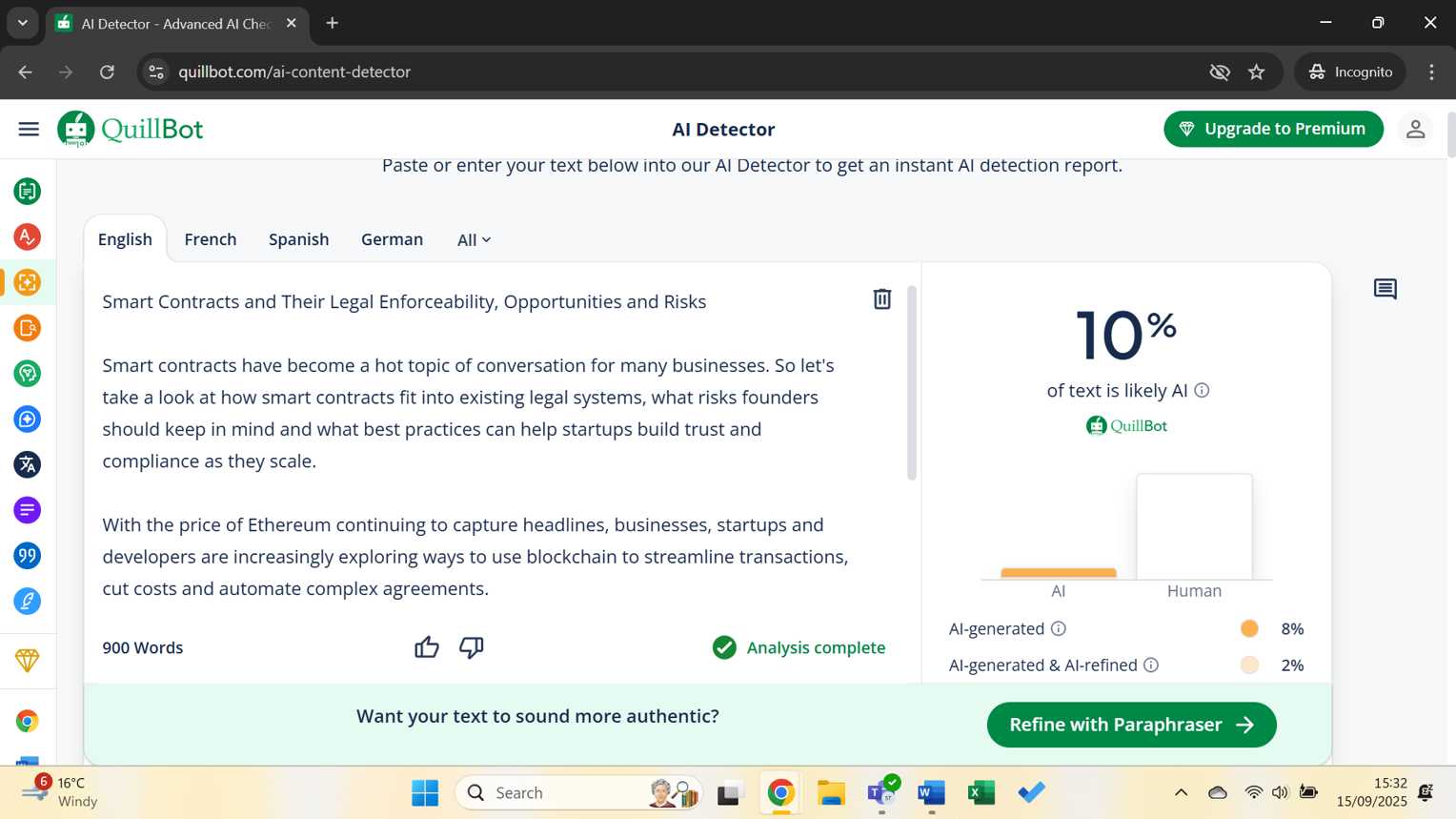Smart Contracts and Their Legal Enforceability, Opportunities and Risks

Smart contracts have become a hot topic of conversation for many businesses. So let’s take a look at how smart contracts fit into existing legal systems, what risks founders should keep in mind and what best practices can help startups build trust and compliance as they scale.
With the price of Ethereum continuing to capture headlines, businesses, startups and developers are increasingly exploring ways to use blockchain to streamline transactions, cut costs and automate complex agreements.
Understanding smart contracts and their current status
A smart contract is basically a computer program that automatically executes an agreement when conditions (that are set beforehand) are met. These contracts don’t depend on intermediaries or manual oversight. Instead, a code is deployed on a blockchain that ensures promises are kept. Many businesses are opting for smart contracts because they make the process smoother, quicker and leave less room for human error. Ethereum introduced this concept. The network offers a programmable layer that allows developers and startup teams to write and deploy such agreements. The automation in this process could potentially revolutionize a number of industries, including real estate and finance.
However, the law behind smart contracts is still developing. This is more complex and different jurisdictions take different approaches. In some areas, courts and regulators are starting to recognize blockchain-based agreements as valid under existing contract law if they meet the basic requirements that are included.
Binance Regional Director of DACH Jonas Juenger notes that innovations are empowering communities to participate in crypto confidently, underscoring the need for legal frameworks to keep pace with innovation: “Local Binance Pay collaborations show how crypto is becoming part of everyday life – including grocery shopping in supermarkets, and highlights the powerful synergy between traditional retail and digital payment solutions, offering an enriched shopping experience. It’s proof that crypto isn’t just for traders or institutions, it’s for everyone.”
Yet questions remain about interpretation. What happens if the code has a bug that leads to unintended consequences? Who is liable if one party claims the contract was unconscionable or entered under duress? These are not merely theoretical issues.
Key legal challenges for startups
One of the main challenges for startups building in Web3 is the intersection between code and legal language. Smart contracts are extremely precise which can create inflexibility. Most traditional contracts will often rely on terms like “reasonable efforts” or “material breach,” which require human judgment. Translating these concepts into deterministic code is extremely difficult. It’s this gap that can lead to outcomes that are legally correct in code but unfair in practice.
Jurisdiction is another major challenge. Blockchain networks are global. However, it might not be clear which country’s law applies to a dispute. Without having clear legislation in place, a court would have to decide on a case-by-case basis. This could cause a lot of uncertainty. There could also be times that enforcement requires off-chain remedies like compelling a party to perform or awarding damages. A blockchain would not be able to provide this by itself.
Nils Andersen-Röed, Global Head of FIU, has pointed out Binance’s role in crypto security for businesses moving forward: “At Binance, we are committed to fostering a maturing crypto ecosystem where innovation, regulation, and security work hand in hand. Joining the T3+ initiative reflects our dedication to proactive collaboration with industry partners and law enforcement to combat illicit activity in real time.”
For example, consumer protection is another concern. An individual could enter an irreversible agreement without fully understanding what could come with it. Many lawmakers are now pushing for disclosure requirements and even restrictions on certain automated contracts. The CFTC granting Polymarket approval to operate in the U.S. shows that regulators are starting to acknowledge the importance of providing a compliant framework for blockchain-based activities.
Best practices for startup founders drafting smart contracts
Regardless of the different challenges, there are a number of steps a startup can take in order to minimize risk. A popular approach is to combine an on-chain code with an off-chain written agreement. This means that founders can capture the efficiencies of automation and provide a legally recognized document that outlines rights, obligations and dispute resolution mechanisms at the same time. A court can then refer to the written agreement to interpret the intent behind the code.
Moreover, conducting formal code audits before deployment is also effective. A security review can catch vulnerabilities early on, helping you to avoid trouble down the line, like hacks or unexpected contract behavior. Binance Research has highlighted that institutional interest in Ethereum is rising with ETF inflows nearly matching Bitcoin, signaling that well-audited, transparent infrastructure will attract significant capital. It’s important for legal advisors and developers to work closely to ensure the code aligns with the business model and investor expectations.
A startup should keep a clear record of documents and communication with users. A governing law, jurisdiction and dispute resolution forum can help reduce uncertainty. This includes fail-safe mechanisms that can allow for halting execution. This is in case of a discovered bug or exploit can prevent catastrophic losses. Catherine Chen of Binance notes that conservative investments in top-cap tokens are appropriate for institutions. This suggests that early-stage ventures should also carefully select the underlying blockchain for their products.
Smart contracts and the road ahead
As lawmakers, regulators and courts gain more experience with blockchain technology, smart contracts will continue to grow and evolve. In fact, there are already jurisdictions exploring legislation that explicitly recognizes blockchain records and automated agreements as legally binding.
Binance Research has noted that the White House’s policy roadmap is paving the way for regulatory clarity. This could accelerate the convergence of Wall Street and Web3, for early-stage founders. A startup that embraces these challenges early and combines innovation with legal foresight will not just adapt to the future of contracts but help define it.





